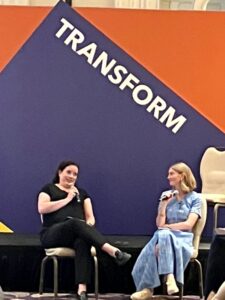It’s all about the people. We hear it over and over again, but it was made clear to me at Corporate Legal Operations Consortium’s 2023 Global Institute. As generative artificial intelligence (generative AI) was blared at us from every stage, booth, and press release, the people I spoke to were more focused on what the impact would be on people and how people could enjoy more collaboration and success.

This was a strange but wonderful conference for me. As I have stated many times before, I am a conference junkie. I love seeing people in real life, and I love attending sessions to hear the hope and optimism and experience of others (so much so that I always joke on social media that I wish I had Hermione’s time-travel necklace to allow me to attend all the simultaneously-held sessions I want).
But since I started my own business, I have to use my time differently at conferences. I may need to spend time having conversations in a booth (like I did at the National Association of Law Placement’s annual conference, where I didn’t get to attend even one session). Or I may spend more of my time speaking (at CGI, I devoted 3 hours of the conference to leading a workshop, moderating a braindate, or speaking on a podcast.) Luckily, I discover just as many innovative and thought-provoking ideas from my conversations (whether from the stage or at booths or happy hours) as I do from listening to speakers.
How will generative AI impact people?
Through all the many announcements of how life-changing generative AI would be, I heard some great conversations on how generative AI might impact people.
In a conversation with DISCO VicePresident Katie DeBord and Cenza CEO Aditya Mirza, we discussed how many parts of the discovery and litigation process will be at least jump-started by the use of generative AI – but we also discussed what clients would find value in (i.e. sage business advice and wisdom partners might dispense):
How many parts of the discovery and litigation process will be at least jump-started by the use of generative AI–and what will clients find value in?
How will associates get to that level of experience? What tasks will they spend their time doing if generative AI takes some of those more entry-level tasks? How are law firms changing their assignments or training based on this information? Will more firms teach mini-MBA programs to impart business skills and knowledge sooner? Will we see a greater increase of secondments?
Ironclad Chief Community Officer Mary O’Carroll noted that “AI has the potential to leapfrog us past painful technology.” She discussed how the more powerful AI available today and improving every day has the potential to solve knowledge management issues all our current technology has failed to really solve. She discussed how AI could bypass the need for document management systems to help employees find documents prepared by their colleagues. How can AI free up in-house attorneys to just focus on the lessons they can learn from one another – instead of finding the sources of those? Will attorneys be able to spend more advising the business on growth strategies based on those lessons?
“AI has the potential to leapfrog us past painful technology” — Mary O’Carroll
On the law firm side, generative AI has the ability to impact many aspects of firm life. In a conversation with Taft Chief Client and Innovation Officer Lyndsay Capeder, we discussed how firms need to think strategically about it, from compensation to professional development. Firms will need their business professionals from across departments to collaborate to meet the challenge of ensuring they’re deploying, training, and compensating attorneys in a way that motivates and encourages their future leadership and drives succession planning.
Legal technology companies can’t abandon their roadmaps for generative AI
Legal technology companies too need to think about the true significance and benefit now of embedding generative AI into their products.

In a conversation between three legaltech founders and CEOs – Linksquares’s Vishal Sunak, Malbek’s Matt Patel, and Cenza’s Mirza, they discussed the importance of not losing sight of your technology roadmap and continuing to build out the functionality that legal and business teams need to drive efficiency and collaboration – which may not involve generative AI. Sometimes it’s a very unsexy feature not even using AI that can solve a small but significant pain point for a user and can win over the most reluctant user of technology, whether on the legal team or business team.
Sharing who you are and what you bring to the table–and what’s in it for your colleagues, clients, or prospective clients – are skills more are flocking to develop. Nicola Shaver, founder and CEO of LegalTechnology Hub, and I were happily surprised that the personal branding workshop we taught with was standing-room only.
You likely didn’t start in this job just after finishing your education, and whether you’re still with this company at retirement or not, you’ll hopefully not be in this same role.

We focused on why honing and sharing your personal brand is so important to innovators, who need to gain the trust of those whom they’re encouraging to adopt technology and new processes. You likely didn’t start in this job just after finishing your education, and whether you’re still with this company at retirement or not, you’ll hopefully not be in this same role.
In a conversation, Netflix’s Jenn McCarron too emphasized that no one cares as much about your career as you do. So while you may not feel comfortable bringing your true and authentic voice out at work right away, it’s crucial you find what you’re passionate about and share it. People will come to know you for that thing and associate you with that.
Alex Su and Priya Lele emphasized that in their workshop as well – examine opportunities that may arise in the ashes of setbacks to find what you love and want to pursue and your brand will naturally arise out of that. Clearly my professional life has had many twists and turns — and I would likely still be a lawyer practicing law miserably if I’d not seized opportunities to find what I loved.
Honing and sharing your personal brand helps drives relationships – and collaboration
Personal branding helps you not only share what you bring to the table but also drive closer relationships with those around you. In a conversation with Equinox’s Sana Kidwai, we discussed how crucial sharing your voice externally is to driving your visibility internally. In a follow-up braindate with McKesson’s Mary Agbovi, Outside Interactive’s Mateo Sanchez, and Exigent’s William Schiestel, we discussed how you gain the courage to share your voice when it’s so different from those around you – and how to share differing or critical opinions without being negative.
That latter idea – how to make constructive suggestions to your counterparts – is something Blackstone assistant general

counsel Lizzie Christmas and DISCO’s DeBord emphasized in their session on how outside counsel and clients can partner to drive change. Outside counsel may hold the key for cash-strapped legal teams to drive modern and innovative legal service delivery, but they don’t always lead the way without pushing from their clients. But again, it comes down to ensuring outside counsel understand their clients’ business objectives and how they can help them meet those. Developing those closer relationships helps immensely and not just between the attorneys but with firm’s technologists, companies’ Procurement leaders, and more.
Outside counsel may hold the key for cash-strapped legal teams to drive modern and innovative legal service delivery, but they don’t always lead the way without pushing from their clients.
All in all, regardless of what today’s hot new technology is, it once again comes down to the people – how will they use that technology, how do they need to upskill to benefit from using that, which behaviors or practices does it allow them to abandon, and what new things does it enable them to do now to drive better relationships. More conversations with those across the legal industry – those in CLM and ALSP companies, legal operations folks, innovators in law firms, law departments and across all technology companies – will only serve to help us all find new ways to drive change and bring our best selves to work.

